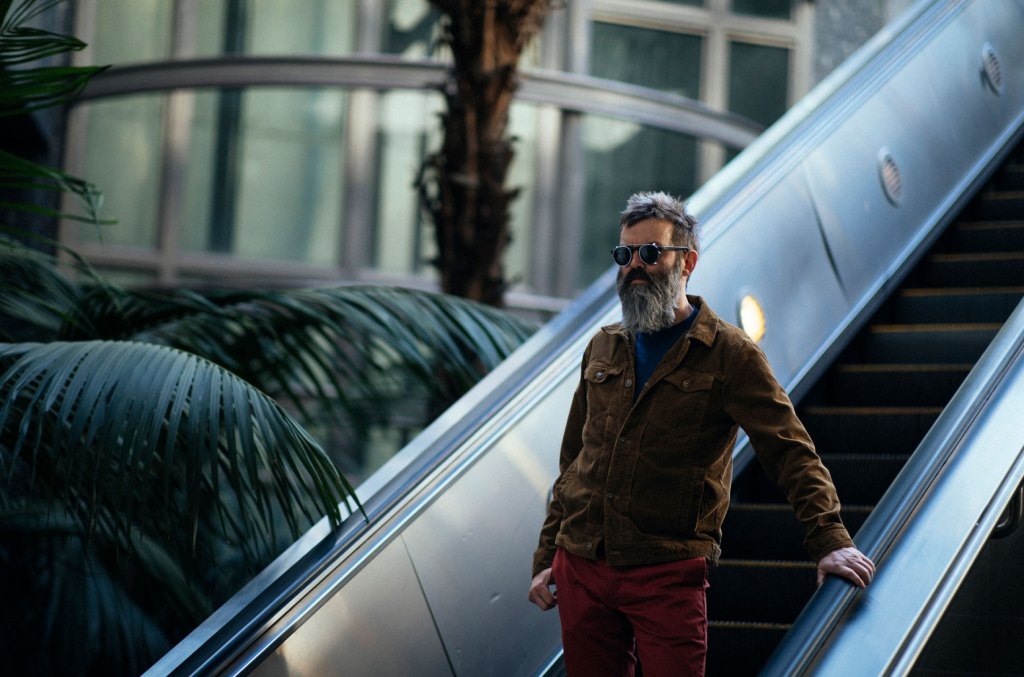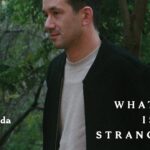When artists set out to promote a new album, their publicists often encouraged them to have “a story.” Mark Oliver Everett, aka E, frontman and chief songwriter of the band EELS, has a lollapalooza of a story. His father, Hugh Everett III, developed the Many Worlds Interpretation of Quantum Mechanics. Today, his theory powers the Marvel multiverse and countless other movies, TV shows, and novels about parallel worlds, but Everett wasn't recognized for his work until late in his short life. He died of a massive heart attack in 1982.
E, then 19, discovered his father's body and, a decade later, endured the deaths of his sister, who committed suicide, and his mother, from cancer. Left without a family, he recounted his experiences in his 1998 EELS masterpiece, Electro-Shock Bluesand the inspirational and funny 2008 autobiography, Things Grandchildren Should Know.
In 2017, Everett's bloodline was restarted when E became a father at the age of 54. But the story doesn't end there. Shortly after the band's post-Pandemic Lockdown Hurricane tour, a CT scan revealed an aortic aneurysm, and E underwent open-heart surgery to repair it.
The health scare did not limit his creativity. On June 7th, EELs released their 15thu studio albums since his formation in 1996 (not counting his two solo records in 1992 and '93). “After 25 or 30 years, whatever, it's finally our time. It's finally EELS time,” he says — which, if you put an exclamation point on the end, is the album's title.

EEL TIME!
Courtesy photo
After a series of tough songs, EEL TIME! finds E, now 61, in a reflective and grateful frame of mind punctuated by a more poppy sound. Below, E discusses the album's collaborative efforts with All-American Rejects frontman Tyson Ritter, the heartwarming music video for “Time,” which depicts three generations of the Everett family, and more.
You've been through a lot in recent years: fatherhood, divorce, open heart surgery.
Is something always right? I've been used to it for a long time.
You have had a great deal of experience with mortality. How does dealing with your own mortality differ from dealing with the deaths of loved ones?
Well, the one thing I don't have any experience in is hospital experience. I've never been to a hospital before, which was great. I am grateful for that. I was in the hospital for a week so this is a big deal. It turned out great. I'm pretty much good as new now.
It's great that you stayed on top of your health.
It's the only good thing that came out of my father who had a heart attack and died at 51. My doctors were telling me that heart stuff can be very hereditary so to keep an eye on things. Get scans. Whichever is the best tech-wise scan, get it. It was a chest CT scan that discovered the problem. [My condition] it had nothing to do with what happened to my father. It's something different, but it's still a matter of the heart, and it's only because of his untimely death that I learned about it.
How has working with Tyson Ritter changed your creative process? Were you working in the same room or were you throwing things back and forth via email?
It's funny because we found out we were neighbors and we literally live three blocks away from each other. But we did it all remotely. It was still the pandemic and I have a young child at school. I didn't want to be the moron who shut down his school with Covid.
Also features “Possum” by indie-pop artist meija. How did this come about?
The Tyson thing started with me singing a song he did. And then the meija thing happened. This just came out of the blue. A mutual friend contacted me and said, “Hey, this guy would love to have you on a song.” He sent me the song and I was like, “Oh, that's cool. Yes, I will.” I got to the point of being in the video.
“If I'm Gonna Go Anywhere” is one of my favorite songs on the album. It has a Bobby Gillespie/Primal Scream vibe,
This is a tribute to Tyson, by the way. This is his musical work. I sing and write lyrics mostly about it.
In the chorus, you sing that if you're going anywhere, you're going “there”. Where is “there”?
It's just that if you have a choice to make, why not make the nice choice. Why not choose love.
“Sweet Smile” is also like that.
That's exactly what “Sweet Smile” is. Sometimes I'll be walking down the sidewalk and realize I'm not disgusted but I'm not smiling. I will think smile. And I'll smile and it's weird. It's like everything feels better and easier when you smile. With this song, I wanted to write my own version [The Seekers] “Georgy Girl.” Just a nice, innocent song about walking down the street.
“We'll never see her the same again” seems to be about someone you've lost. I understand that not every song is autobiographical, but I wonder if you wrote it about your mother or sister, who you lost at a young age.
I wrote it with Chet from EELS and I don't feel like it was about anyone in particular at the time. A lot of the songs I've done over the years I can't access if there's a personal experience I'm writing about. And years later, I'll look back and say, “Ah, that's what I was writing about.” I think it's a coping mechanism that helps me write without a filter — so that I don't know I'm revealing all these things about myself in certain situations.
When I hear “I Can't Believe It's True”, I think could E have found love?
Yes, I hope this song will be one of the songs people play at their weddings. We've had songs that became very popular that we would never have thought of as singles at the time they were released. They get this big life because they get played at weddings or whatever. Really, the inspiration in the back of my mind was thinking about my child. So maybe it can be played at weddings and births.
Has your son Archie formed his own band yet?
No, I got him a little drum set because he's exactly the age I was when I started playing drums. And I didn't want to push it on him. He likes to do everything, but he has shown nowhere near the kind of interest I had in it until now. But that's fine.
It's there if he decides he's into it, but I also think I should probably get him an instrument that would do [him] more money.
In the letter you posted on the EELS website a few days ago, you wrote that you almost lost your mind in the first part of the Lockdown Hurricane show. What crushed you?
First of all, I was super jetlagged. Going to Europe overnight. which always drives me crazy. We hadn't played in almost four years or something because of the pandemic. You may remember the pandemic. So we finally got out there to play and it was an extreme culture shock for me because it was the double whammy of being a new father – a new divorced father – during those lockdown years. I'm really used to not being interested in me. You know what I mean? When you're a father, you're the last person in the family to be teased about. Then suddenly, from the first show of the first tour in almost four years, it was like we all really cared about me and it really blew my mind. I didn't know how to process it, and I didn't know how to act. I don't get stage fright normally. I'm usually very comfortable on stage, but I started having a panic attack right before the first show. The first week, I was just crazy. Then I got my bearings and it was, “Okay, it's coming back to me now. I know how to do that.” I'm sure many people have been through situations like this from being in such an extreme situation during the lockdown years and then being thrown out. Then it was great. It was like, “Oh, people. This is entertainment.”
Will you be touring behind this album?
I don't know when we're going on tour yet. The last one got me a lot. It was good and we worked very hard. But since we just went, it might be too early to go now. Maybe we'll go in late summer or fall. We do not know yet.
“Song for You Know Who” is about not repeating the mistakes of the past and forgiveness. Is this directed at you or someone else?
I will never say. My favorite thing about this song will also become my least favorite thing about it, which is that everyone I know will suspect it's about them. I couldn't help but call it that because I just thought it would drive everyone around me crazy. But I will never tell.
The video for “Time” is very emotional and touching. And having read your book, understanding the feeling of not having a family and now having a family, it's really moving. Did you come up with this idea or was it something you wanted to do for a long time?
When I wrote and recorded the song I didn't have the video idea in mind. It wasn't until later – I can't remember what set me off, but I thought, “Oh, wait a minute. There are three verses. We can do pictures of my dad in the first verse.” It fits the theme of each verse.
Then the second where he's like, “I'm riding the train, I'm ready to stop anywhere and see what's out there,” it's like my little one is making my teenage years and it's COMING to me. Then the last verse is about how I want to be here and I never want to leave because I love being around the ones I love, and that's my son.
The beard looks really strong in the 'Time' video.
It was taken the day after I got home from our tour and I couldn't wait to get rid of the beard. That was my pandemic beard and I was like, “Oh, we're finally going on tour. I'll save it for that. It'll look cool on stage or whatever.” Then I couldn't wait to get rid of it until the end of the tour because a beard like that is a lot of maintenance and a lot of work. So I called the director of the video and said, “I'm going to get rid of the beard.” He said, “No, just save it for a day after the tour and we'll shoot it later.” The next day I cut it a lot.
OK, so you're no longer in Fidel Castro territory.
Not for now. But he can always come back. It comes back overnight if I want it. I have a lot of testosterone.



